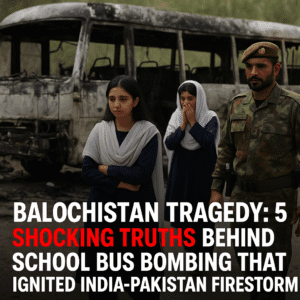Balochistan Tragedy: 5 Shocking Truths Behind School Bus Bombing That Ignited India-Pakistan Firestorm
In the aftermath of a devastating school bus bombing in Balochistan’s Khuzdar district, grief-stricken families like Nasir Mehmood’s face unimaginable loss as their children lie wounded or dead. The attack, which claimed eight lives including six students, has intensified tensions between Pakistan and India, with Islamabad accusing New Delhi of orchestrating cross-border terrorism despite lacking clear evidence. Balochistan’s long-standing insurgency and systemic neglect compound the region’s volatility, while unresolved grievances and human rights abuses deepen local resentments.
The tragedy exposes the fragile ceasefire between two nuclear rivals and the risk that proxy conflicts may spiral out of control. Calls for impartial investigations and sincere diplomatic engagement underscore the urgent need to prioritize human lives over political agendas. Without addressing root causes and fostering transparency, cycles of violence and mistrust will persist, leaving civilians—especially children—as the enduring casualties of geopolitical strife.

Balochistan Tragedy: 5 Shocking Truths Behind School Bus Bombing That Ignited India-Pakistan Firestorm
In a quiet corner of Quetta’s military hospital, Nasir Mehmood’s voice trembles as he recounts the horror of learning his 14-year-old son, Mohammad Ahmad, was among the victims of a school bus bombing in Pakistan’s Balochistan province. “When the news broke, my world collapsed,” he says, describing the chaos as parents raced to the scene, only to find a nightmare of shattered metal, bloodied backpacks, and the piercing cries of injured children. The attack, which killed eight—including six students—and left dozens wounded, has deepened the fissures between Pakistan and India, two nuclear-armed neighbors locked in a fragile ceasefire.
The Attack and Its Immediate Aftermath
On May 23, 2024, a blast tore through an army-operated school bus in Khuzdar, Balochistan, as it carried 40 children aged 12–16. The most critically injured were airlifted to Quetta’s Combined Military Hospital, where scenes of anguish unfolded: unconscious children tethered to ventilators, others writhing with burns and fractures, and one girl repeatedly calling for her mother. Doctors confirmed several remain in critical condition, their futures uncertain.
Balochistan: A Volatile Flashpoint
Balochistan, Pakistan’s largest but least developed province, has long been a cauldron of unrest. A decades-long insurgency led by groups like the Balochistan Liberation Army (BLA)—designated a terrorist organization by the U.S. and U.K.—has accused Islamabad of exploiting the region’s rich natural resources while neglecting its people. Recent attacks, including a March train siege killing 21, underscore the volatility. Yet Pakistan’s government now points fingers not at local militants but at India, alleging cross-border terrorism without presenting concrete evidence.
India-Pakistan: A Cycle of Accusations
The bombing comes amid heightened tensions following a two-week conflict in April, sparked by a tourist site attack in Indian-administered Kashmir that left 26 dead. While Pakistan denies involvement in that incident, it now demands international scrutiny of India’s alleged role in Balochistan. Indian officials, in turn, dismiss the claims as diversionary, reiterating longstanding accusations that Pakistan shelters militants targeting Kashmir.
The Human Cost
Beyond geopolitics, the attack lays bare the human toll of unresolved conflicts. Parents like Nasir grapple with trauma, while survivors face life-altering injuries. Activists highlight broader grievances in Balochistan, where enforced disappearances and alleged military abuses have fueled resentment. “Faceless courts,” proposed by Pakistan’s information minister to protect judges in terror cases, risk further eroding trust in institutions.
Geopolitical Implications
Pakistan’s swift blame of India—despite a lack of public evidence—raises questions. Analysts suggest the move could be strategic, deflecting attention from domestic security failures or galvanizing nationalist sentiment. Conversely, India’s denial aligns with its narrative of Pakistan as a destabilizing actor. The incident tests the recent ceasefire, with both nations walking a tightrope between de-escalation and political posturing.
Why This Matters
- Proxy Warfare Risks: Balochistan’s insurgency has historically drawn external actors. If proven, Indian involvement would mark a dangerous escalation in covert tactics.
- Ceasefire Fragility: The attack underscores how localized violence could unravel diplomatic progress, reigniting broader conflict.
- Human Rights Crossfire: Civilians, especially children, remain pawns in unresolved disputes, highlighting the urgent need for accountability.
Unanswered Questions
- Why has no group claimed responsibility? While the BLA’s silence is unusual, the absence of a claim fuels speculation about external actors.
- Where is the evidence? Pakistan’s vague references to “history” without specifics weaken its case internationally.
- Will investigations be impartial? Islamabad’s rejection of third-party probes contrasts with its demand for transparency in Kashmir.
The Path Forward
For lasting peace, experts urge:
- Transparent Investigations: Independent verification of claims by both nations.
- Addressing Baloch Grievances: Pakistan must confront systemic neglect and human rights concerns fueling militancy.
- Diplomatic Dialogue: India and Pakistan need backchannel talks to prevent isolated incidents from spiraling.
As funeral prayers echo in Khuzdar, the bombing’s legacy hinges on whether leaders prioritize lives over political point-scoring. For now, the bloodstained backpacks and empty desks serve as grim reminders of the cost of division.
You must be logged in to post a comment.